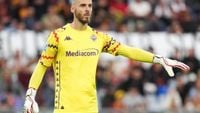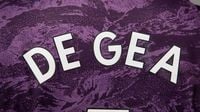David de Gea, the current goalkeeper for ACF Fiorentina, has secured a significant legal victory regarding industrial property rights. The General Court of the European Union (TGUE) recently dismissed an appeal from the German toy company Schmidt Spiele, which sought to block De Gea from registering his "DDG" trademark in the European Union, claiming it could be confused with their own registered trademark, "DOG."
The dispute traces back to September 2021 when De Gea applied to the European Union Intellectual Property Office (EUIPO) to register the "DDG" sign for use in various products, including toys, video games, sports articles, and Christmas decorations. Schmidt Spiele opposed the registration, arguing that the "DDG" sign could be confused with their internationally registered "DOG" trademark, which covers board games, cards, and video games.
According to Emilia López Camba, a lawyer specializing in industrial property at PONS IP, Schmidt Spiele contended that the design of De Gea's trademark could negatively impact their interests, as consumers might associate the two brands due to their similar graphical presentation. The toy company pointed out that both logos feature three uppercase letters in bold font, dark colors, and a white outline, which they believed could lead to confusion.
In April 2023, the EUIPO rejected Schmidt Spiele's opposition, stating that there was no risk of confusion between the two trademarks. The office concluded that the European public would clearly identify the sequence "D-D-G" in De Gea's logo, rather than interpreting it as the word "dog." Furthermore, the EUIPO emphasized that the design of De Gea's trademark was not merely decorative but contained distinctive elements.
Despite the EUIPO's decision, Schmidt Spiele escalated the case to the TGUE. The court upheld the EUIPO's analysis, firmly rejecting Schmidt Spiele's main argument that consumers would likely confuse the two trademarks due to the nature of the products involved. The court noted that while toys are common consumer goods, this does not imply that consumers lack the ability to distinguish between clearly different brands. The court stated that the level of attention from the public is moderate, allowing for sufficient discernment between the two trademarks.
Emilia López Camba pointed out that all instances of the EUIPO and the General Court of the EU have dismissed Schmidt Spiele's claims, asserting that the potential evocation of their brand by De Gea's trademark does not create a general association, particularly since the products are not everyday consumer items and not necessarily low-cost. The court also highlighted that there was no evidence that a significant portion of the public could perceive the letters "D-O-G" in De Gea's logo or interpret it as the English word for dog.
The court's ruling emphasized that the graphic and phonetic similarity between the two signs is "very weak" and concluded that even in the most favorable scenario for Schmidt Spiele—where consumers might not understand the term "dog"—there could be no conceptual coincidence between the brands.
Consequently, the court concluded that there is no risk of confusion between the two signs, even if the products referred to are considered identical. This ruling validates David de Gea's right to register and use his "DDG" logo in the European market.
While Schmidt Spiele retains the option to file a cassation appeal before the Court of Justice of the EU, the recent ruling represents a significant legal triumph for the Spanish goalkeeper in his business endeavors beyond the football field. Emilia López Camba noted that in matters of trademark protection, there are additional strategies or alternatives to registration challenges when the practices of the Offices and Courts do not support claims like those made by Schmidt Spiele.
She added that the renown, recognition, market presence, or distinctiveness acquired through use not only enhances the trademark's value but also strengthens its protection against third parties.
David de Gea's victory in this legal battle not only reinforces his brand identity but also opens doors for future business ventures beyond his football career. With this ruling, the goalkeeper solidifies his presence in the business world, paving the way for potential projects that leverage his name and image.





